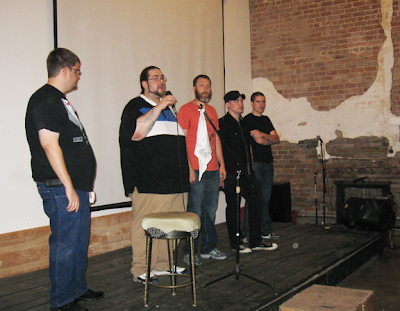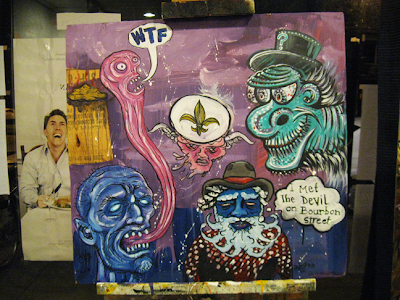 |
| Passing new laws is all about control and Bill is a control F-R-E-A-K |
As of July 1st, my home state has adopted Tennessee Code Title 39, Chapter 17, Part 3 which bans the transmission of “Potentially Offensive Images” via the internet.
Governor Bill Haslam signed this bill into effect last month, making us the first state in the country to put forth such a measure which CLEARLY snubs The First Amendment and Freedom of Speech. Violators of this newly formed law are subject to misdemeanor charges and a conviction to serve up to one year in jail and pay a $2500 fine.
Before we get into the potential ramifications of this glob of snot spat on the Bill of Rights, here’s where this all got started… The new law is actually a modification to Public Chapter 362 of Tennessee Law. The original legislation made it a crime to email, call or otherwise communicate to an individual with the intent to cause emotional distress. The legislation was an attempt to curb what is referred to as “cyber bullying,” a growing problem amongst youth in schools. Cyber bullying has caused children to be humiliated, stop going to school for fear of ridicule and even driven students to suicide in extreme cases. It’s my firm opinion that stifling such juvenile behavior falls under the jurisdiction of decent parenting. Putting forth a law making such communication illegal is a clear-cut violation of Freedom of Speech. Keep in mind that very tough calls have to be made by our justice system to uphold our First Amendment rights; this includes allowing groups such as
The Westboro Baptist Church (the “God Hates Fags” nut jobs) and The Ku Klux Klan (famous for lynching black folks and burning crosses) to assemble publicly and inject their rhetoric into the public pool of thought. We may not always agree with the issue at hand, however it is essential that these rulings take place in order to preserve one of the basic rights our country was founded on.
As of this month, it is now illegal to post an image to the internet in the state of Tennessee which may “frighten, intimidate or cause emotional distress.” These terms include emailing, tweeting or posting the image in any form or fashion. In a recent interview, Knoxville lawyer Rick Hollow was asked to clearly define the limitations of this law. “We’re left to our own interpretations,” Rick stated. What exactly is considered to be offensive? The attorney says, “Just about anything that the individual finds to be annoying, harassing or intimidating.”
Let’s try real quick to clarify the term, “Potentially Offensive…”
Potentially is defined as “Possibly but not yet actually.” Soooooo according to this term, the image doesn’t even have to be outright offensive to breach the law, only have the potential to offend someone. See the grey canyon of interpretation?
Offensive is defined as “Causing resentful displeasure, irritating, angering or annoying.” A fun fact is the example used on Dictionary.com is “offensive television commercial.” Now that’s something we could make illegal and nobody would complain! As human beings, I’m certain there’s nobody who could make it an hour of surfing the web and not find something annoying or irritating out there. Throw a stone anyone?
Now if laying these definitions out doesn’t make the law vague enough for you, this next tidbit will really burst your freedom-fighting bubble. The new law doesn’t require the picture in question to be of or about the person of persecution! An individual only has to find an image someone uploads offensive to have them arrested and fined. Furthermore, the government wouldn’t even have to prove the defendant’s intentions. The fault lies on the person who posted the image- which applies to chain of possession. In other words, don’t be scared to share my portrait of Governor Haslam and his wife,
Crissy- only I am liable.
Thankfully we DO have freedom of speech and expression in our country and groups which help to enforce them. In 1997, the
ACLU took on Janet Reno and her
Communications Decency Act, which attempted to make certain interactions and materials on the internet illegal. All nine Justices of the Supreme Court unanimously voted to strike down certain provisions of this act as violations of The First Amendment. Freedom of Speech in art has been upheld for over 50 years from cases such as
Winters vs. New York (1948) where the content of comic books was put on trial.
Media Coalition and The ACLU of Tennessee are taking up the torch on this issue and have announced their lawsuit against the State of Tennessee for violating The First Amendment.
“ACLU-TN, joined by the Media Coalition plans to file a lawsuit challenging the new state “offensive images” law which makes it a crime to post any image online that causes “emotional distress” to any individual. This new law, which went into effect July 1st, creates a chilling effect on expressive political, artistic, and otherwise lawful speech and also turns political activists, artists and others into criminals. Basically anyone with an online presence sharing images becomes vulnerable to prosecution.”
To voice your concern about this new provision of our state law to Governor Haslam, contact him directly at his office by calling (615) 741-2001 or contact him via email to
bill.haslam@tn.gov
-Brandt Hardin (Clarksville, TENNESSEE)
Is the legislation JUST or UNJUST?
Are you OFFENDED more by the ART or the LAW?
Leave your comments and tell me...

















































